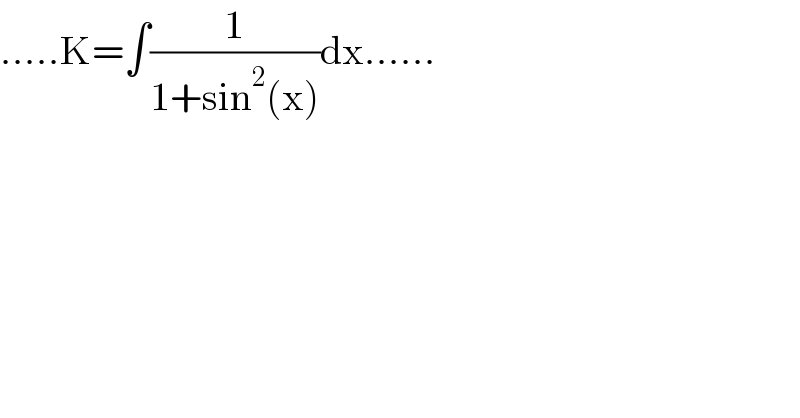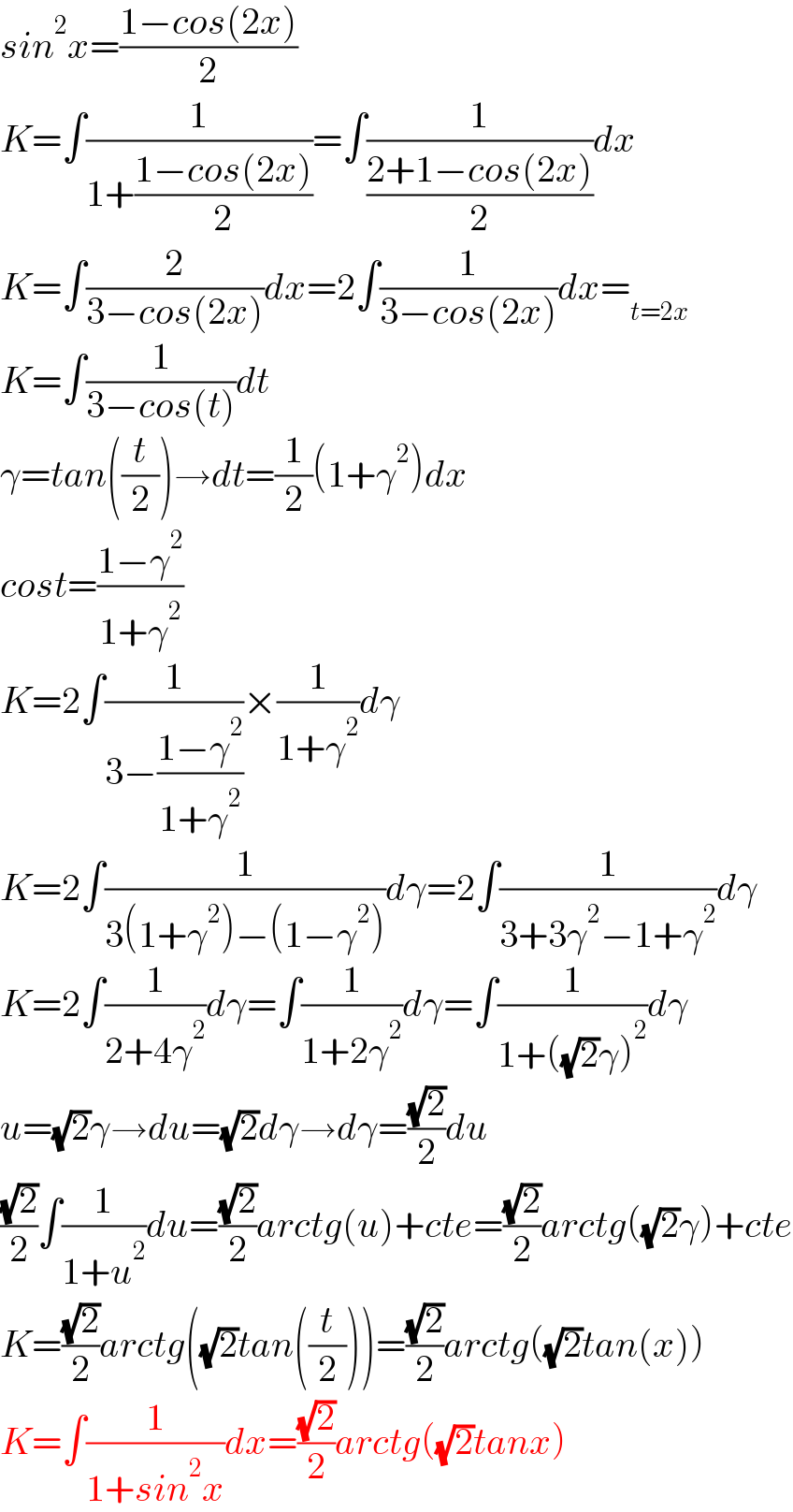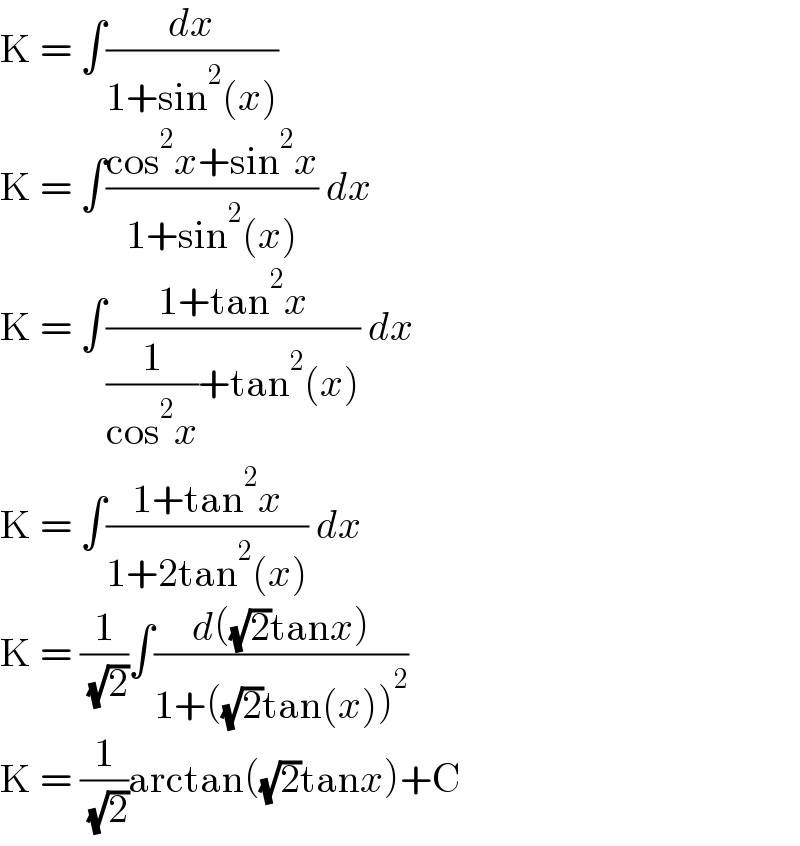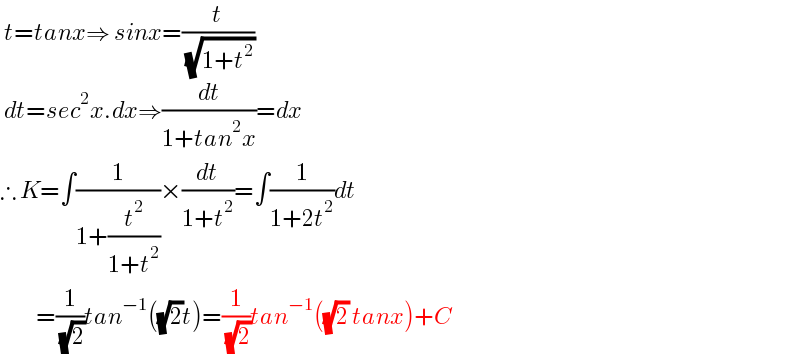
Question Number 149608 by puissant last updated on 06/Aug/21

$$.....\mathrm{K}=\int\frac{\mathrm{1}}{\mathrm{1}+\mathrm{sin}^{\mathrm{2}} \left(\mathrm{x}\right)}\mathrm{dx}...... \\ $$
Answered by ArielVyny last updated on 06/Aug/21

$${sin}^{\mathrm{2}} {x}=\frac{\mathrm{1}−{cos}\left(\mathrm{2}{x}\right)}{\mathrm{2}} \\ $$$${K}=\int\frac{\mathrm{1}}{\mathrm{1}+\frac{\mathrm{1}−{cos}\left(\mathrm{2}{x}\right)}{\mathrm{2}}}=\int\frac{\mathrm{1}}{\frac{\mathrm{2}+\mathrm{1}−{cos}\left(\mathrm{2}{x}\right)}{\mathrm{2}}}{dx} \\ $$$${K}=\int\frac{\mathrm{2}}{\mathrm{3}−{cos}\left(\mathrm{2}{x}\right)}{dx}=\mathrm{2}\int\frac{\mathrm{1}}{\mathrm{3}−{cos}\left(\mathrm{2}{x}\right)}{dx}=_{{t}=\mathrm{2}{x}} \\ $$$${K}=\int\frac{\mathrm{1}}{\mathrm{3}−{cos}\left({t}\right)}{dt} \\ $$$$\gamma={tan}\left(\frac{{t}}{\mathrm{2}}\right)\rightarrow{dt}=\frac{\mathrm{1}}{\mathrm{2}}\left(\mathrm{1}+\gamma^{\mathrm{2}} \right){dx} \\ $$$${cost}=\frac{\mathrm{1}−\gamma^{\mathrm{2}} }{\mathrm{1}+\gamma^{\mathrm{2}} } \\ $$$${K}=\mathrm{2}\int\frac{\mathrm{1}}{\mathrm{3}−\frac{\mathrm{1}−\gamma^{\mathrm{2}} }{\mathrm{1}+\gamma^{\mathrm{2}} }}×\frac{\mathrm{1}}{\mathrm{1}+\gamma^{\mathrm{2}} }{d}\gamma \\ $$$${K}=\mathrm{2}\int\frac{\mathrm{1}}{\mathrm{3}\left(\mathrm{1}+\gamma^{\mathrm{2}} \right)−\left(\mathrm{1}−\gamma^{\mathrm{2}} \right)}{d}\gamma=\mathrm{2}\int\frac{\mathrm{1}}{\mathrm{3}+\mathrm{3}\gamma^{\mathrm{2}} −\mathrm{1}+\gamma^{\mathrm{2}} }{d}\gamma \\ $$$${K}=\mathrm{2}\int\frac{\mathrm{1}}{\mathrm{2}+\mathrm{4}\gamma^{\mathrm{2}} }{d}\gamma=\int\frac{\mathrm{1}}{\mathrm{1}+\mathrm{2}\gamma^{\mathrm{2}} }{d}\gamma=\int\frac{\mathrm{1}}{\mathrm{1}+\left(\sqrt{\mathrm{2}}\gamma\right)^{\mathrm{2}} }{d}\gamma \\ $$$${u}=\sqrt{\mathrm{2}}\gamma\rightarrow{du}=\sqrt{\mathrm{2}}{d}\gamma\rightarrow{d}\gamma=\frac{\sqrt{\mathrm{2}}}{\mathrm{2}}{du} \\ $$$$\frac{\sqrt{\mathrm{2}}}{\mathrm{2}}\int\frac{\mathrm{1}}{\mathrm{1}+{u}^{\mathrm{2}} }{du}=\frac{\sqrt{\mathrm{2}}}{\mathrm{2}}{arctg}\left({u}\right)+{cte}=\frac{\sqrt{\mathrm{2}}}{\mathrm{2}}{arctg}\left(\sqrt{\mathrm{2}}\gamma\right)+{cte} \\ $$$${K}=\frac{\sqrt{\mathrm{2}}}{\mathrm{2}}{arctg}\left(\sqrt{\mathrm{2}}{tan}\left(\frac{{t}}{\mathrm{2}}\right)\right)=\frac{\sqrt{\mathrm{2}}}{\mathrm{2}}{arctg}\left(\sqrt{\mathrm{2}}{tan}\left({x}\right)\right) \\ $$$${K}=\int\frac{\mathrm{1}}{\mathrm{1}+{sin}^{\mathrm{2}} {x}}{dx}=\frac{\sqrt{\mathrm{2}}}{\mathrm{2}}{arctg}\left(\sqrt{\mathrm{2}}{tanx}\right) \\ $$
Commented by puissant last updated on 06/Aug/21

$$\mathrm{propre}\:\mathrm{merci}.. \\ $$
Answered by Olaf_Thorendsen last updated on 06/Aug/21

$$\mathrm{K}\:=\:\int\frac{{dx}}{\mathrm{1}+\mathrm{sin}^{\mathrm{2}} \left({x}\right)} \\ $$$$\mathrm{K}\:=\:\int\frac{\mathrm{cos}^{\mathrm{2}} {x}+\mathrm{sin}^{\mathrm{2}} {x}}{\mathrm{1}+\mathrm{sin}^{\mathrm{2}} \left({x}\right)}\:{dx} \\ $$$$\mathrm{K}\:=\:\int\frac{\mathrm{1}+\mathrm{tan}^{\mathrm{2}} {x}}{\frac{\mathrm{1}}{\mathrm{cos}^{\mathrm{2}} {x}}+\mathrm{tan}^{\mathrm{2}} \left({x}\right)}\:{dx} \\ $$$$\mathrm{K}\:=\:\int\frac{\mathrm{1}+\mathrm{tan}^{\mathrm{2}} {x}}{\mathrm{1}+\mathrm{2tan}^{\mathrm{2}} \left({x}\right)}\:{dx} \\ $$$$\mathrm{K}\:=\:\frac{\mathrm{1}}{\:\sqrt{\mathrm{2}}}\int\frac{{d}\left(\sqrt{\mathrm{2}}\mathrm{tan}{x}\right)}{\mathrm{1}+\left(\sqrt{\mathrm{2}}\mathrm{tan}\left({x}\right)\right)^{\mathrm{2}} }\: \\ $$$$\mathrm{K}\:=\:\frac{\mathrm{1}}{\:\sqrt{\mathrm{2}}}\mathrm{arctan}\left(\sqrt{\mathrm{2}}\mathrm{tan}{x}\right)+\mathrm{C} \\ $$
Commented by puissant last updated on 06/Aug/21

$$\mathrm{jolie}\:\mathrm{merci}.. \\ $$
Answered by nimnim last updated on 16/Aug/21

$$\:{t}={tanx}\Rightarrow\:{sinx}=\frac{{t}}{\:\sqrt{\mathrm{1}+{t}^{\mathrm{2}} }} \\ $$$$\:{dt}={sec}^{\mathrm{2}} {x}.{dx}\Rightarrow\frac{{dt}}{\mathrm{1}+{tan}^{\mathrm{2}} {x}}={dx} \\ $$$$\therefore\:{K}=\int\frac{\mathrm{1}}{\mathrm{1}+\frac{{t}^{\mathrm{2}} }{\mathrm{1}+{t}^{\mathrm{2}} }}×\frac{{dt}}{\mathrm{1}+{t}^{\mathrm{2}} }=\int\frac{\mathrm{1}}{\mathrm{1}+\mathrm{2}{t}^{\mathrm{2}} }{dt} \\ $$$$\:\:\:\:\:\:\:\:\:=\frac{\mathrm{1}}{\:\sqrt{\mathrm{2}}}{tan}^{−\mathrm{1}} \left(\sqrt{\mathrm{2}}{t}\right)=\frac{\mathrm{1}}{\:\sqrt{\mathrm{2}}}{tan}^{−\mathrm{1}} \left(\sqrt{\mathrm{2}}\:{tanx}\right)+{C} \\ $$
Commented by puissant last updated on 06/Aug/21

$$\mathrm{jolie}.. \\ $$
Answered by Ar Brandon last updated on 06/Aug/21

$${K}=\int\frac{{dx}}{\mathrm{1}+\mathrm{sin}^{\mathrm{2}} {x}}=\int\frac{\mathrm{cosec}^{\mathrm{2}} {x}}{\mathrm{cosec}^{\mathrm{2}} {x}+\mathrm{1}}{dx}=\int\frac{\mathrm{cosec}^{\mathrm{2}} {x}}{\mathrm{2}+\mathrm{cot}^{\mathrm{2}} {x}}{dx} \\ $$$$\:\:\:\:=−\int\frac{{d}\left(\mathrm{cot}{x}\right)}{\mathrm{2}+\mathrm{cot}^{\mathrm{2}} {x}}=−\frac{\mathrm{1}}{\:\sqrt{\mathrm{2}}}\mathrm{arctan}\left(\frac{\mathrm{cot}{x}}{\:\sqrt{\mathrm{2}}}\right)+{C} \\ $$
